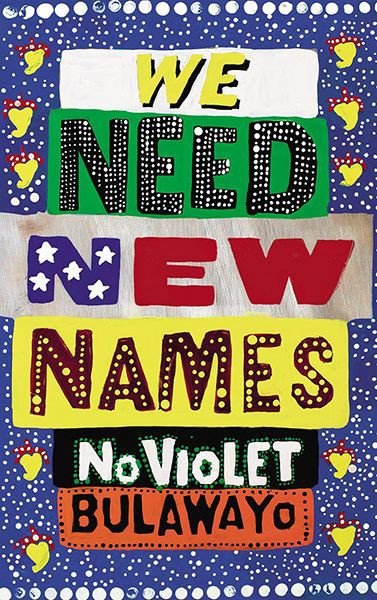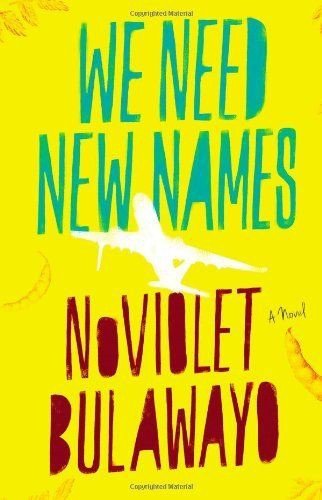We Need New Names || A Book Review.
It was nice to see another novel that portrayed themes of Africa's constant war against hunger, political unrest, apathy, corruption, and the woes young people have to face as a result of bad governance.
When I picked up this book, I didn't know what to expect as I never came across a piece from NoViolet Bulawayo prior to this, but the book title was enough to keep me going..

"We Need New Names" is a book about Darling, and her friends, who live in a makeshift shelter after being evacuated, from their homes, alongside their families.
A semi-autobiographical novel that captures the world of the childhood of Darling and her friend Bastard, Chipo, Godknows, Shbo and Stina growing up in the ironically named Paradise, a township in Zimbabwe.
Having the luxury of time, due to their inability to return to school, they spend time foraging the home of the wealthy for guavas.
When an opportunity comes for Darling to move to America, will she survive in an entirely new country?
Will she eventually get to achieve her dreams of attending an Ivy league college, and making something of herself, entirely different from who she was in Zimbabwe?
The novel is divided into two parts: the first part depicts the challenges of poverty, violence and hunger Darling and her friends have to face in Zimbabwe, while the second parts depicts Darling's journey to America and the cultural shock she has to adapt to, as she begins a totally new life.
Through this book, we get to see Darling's struggle as an immigrant. The struggles of adapting and conforming in a new world.When I started reading this book, it evoked a whirlwind of emotions in me.
I screamed at the unfairness of the reality of Darling and her friends, particularly Chipo, who gets impregnated by her own grandfather, and eventually gets to undergo a brutal abortion. I was enraged at what Chipo had to endure at a very young age because of the failed system.
Violence and tragedy are unexpectedly casual parts of their lives, which is unfair, seeing that they do not get to experience the realities of proper childhood.
There have however been various criticisms at the author's narrative style. While many readers, like myself, see this book as a coming of age story that portrays the ills so many children have been subjected to, many others believe that the author towed the line of new age African author's, who project only the sufferings of Africa.
However, I would beg to disagree, as books like "We need new names" might be the only way other countries come to sympathise with the reality African children find themselves in.
Did I mention that parental neglect and poverty contributed to Darling and her friends being unable to have access to a proper education? Or that Chipo's experience of being raped by her own grandfather, who is naturally meant to protect her from predators, would serve as an enlightenment to the various abuses some girls have had to endure from the very ones who are meant to protect them.
It was as though the majority of the male characters in this novel were deficient in their roles as protectors. From Chipo's grandfather, to Darling's father, who suddenly returns with AIDS.
I also loved how the author highlighted and brought into clearer light the challenges immigrants face, in the chase for a better future.
Most Africans, believe immigrating to first world countries, immediately changes their reality to a better one.
They fail to understand the challenges they'll face trying to adjust to a new system. Darling had dreams of attending an Ivy league college, but soon enough, she longed to return to Zimbabwe, because the reality was a little difficult to adjust to.
Her aunt worked two jobs, to pay off mortgage for a house as little as the wealthy neighbourhood she and her friends stole from back in Zimbabwe.
Her aunt also portrayed the struggles of women who are subjected to various humiliating experiences to keep their marriages.
Her aunt, Fostalina's marriage fell apart even as she struggled every day to look like the thin model-like women she saw on TV.

My Opinion
I applaud the author's expression of the fact that, while Africa might be peculiar for facing challenges of poverty, hunger, and the likes, America also has its own fair share of problems.
I also applaud the fact that immigrants are made to be aware of what lies ahead, and that relocating to America might not be all roses.
My favorite character in this book has to be Darling. Faced with the sort of reality she is forced to live with, one would expect her to turn out a certain way.
But surprisingly, for someone of her age, she exudes clarity on what she wants, and even acts as a mini leader to her group of friends. She also uses sophisticated English in some parts of the novel, and I couldn't be more intrigued by her character.
I also loved that her character did not completely conform to the theme of the book. She stood out as her own person in the book for me.
Recommendation
This book does not only dive into the struggles of living in Africa, it goes an extra mile to show readers that irrespective of where they grow up or where they find themselves, there is always room for growth and development. Afterall, we are the authors of our destinies. Yes?
I recommend this book to anyone looking to explore contemporary African literature and gain insight into Zimbabwe's socio-political landscape.
Love🤍
Her friends name is Bastard?
I think that's a reason to read the book.
A really good convincing reason to😂
They all had weird names fr. Names that I couldn't even explain 😂
Imagine bearing Bastard for the rest of one's life.
Roll call in school would be hell.
Then the unlucky guy would have to say Present...
Sad
This novel sounds pretty motivating. Sometimes I wonder what has caused most Africa to continue suffer with political problems. Is it because the legacy of colonialism that caused people to be corrupt? in South East Asia, some of us have this rampant corruption problem too and some of it was the result of colonial era. Would you say it's the same in some African countries too?
I feel with African countries, it has to do with the leaders. A majority of the leaders know the right thing to do but for reasons best known to them, they take the wrong turn. Their bad decisions always has a negative effect on a majority of the citizens too.
Sometimes, It feels like they derive joy (and loads of money) from "corruption".
As much as I enjoy reading African books that portray the struggles of a lot of people here, I think I'm at a point in my life where I'd rather not read about all the overwhelming hopelessness in these parts. Just too sad for my taste rn.
P.S: I love the dexterity to your book reviews, Best. Truly a top kid.😄
The book was a vivid reminder of what many people face in this continent on a daily basis. A sad reality.
Also,thank you so much best. I learnt from the best after all.😙
I'd have to confess to starting put this book bit not seeing it through. I can't tell why exactly I put it way but I think I guess I wasn't just feeling it at the time.
Maybe a trial would help. I'll see about that.
Congratulations @wongi! You have completed the following achievement on the Hive blockchain And have been rewarded with New badge(s)
Your next target is to reach 33000 upvotes.
You can view your badges on your board and compare yourself to others in the Ranking
If you no longer want to receive notifications, reply to this comment with the word
STOP